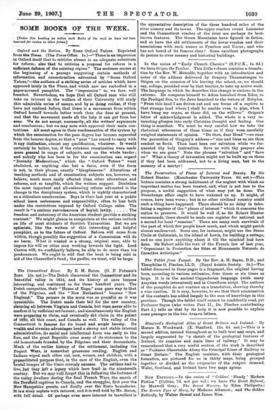SOME Boars OP THE WEEK.
[Under this heading us notice such Book, of the week as have not been reserved for Teri., in other forma]
. .
Orford and the Nation. By Some Oxford Tutors. Reprinted from the Times. (The Timm Office. There is att impression in Oxford itself that to criticise abuses is an adequate substitute for reform; elm that to criticise a proposal for reform is a. setfiehmt defence of the existing regime." The sentence occurs at the beginning of a passage suggesting certain methods of reformation and reconstruction advocated by "Some Oxford Tutors,"—the authors of a striking series of articles which have, appeared lately in the Times, and which now are embodied in a paper-eovered. pamphlet. The "impression" is, we fear, well founded. Neverthelese, we hope that all Oxford men who still take AU interest in the welfare of their University will study Ibis admirable series of essays, and by ea aoilig realim, if they have net realised before, that there is a 1310,70M044 from within, Oxford herself towards better work than she a0e4 at present, and that the movement needs all the help it can get from her seas. We do not accept, neeessarily, all the writers' arguments and conclusions ; but we may note with approval their main con- tentions. All must agree in their condemnation of the system by which the examination for the pass degree has beceme separated from the honour degree, so that a "puss" has ceased to carry with it say dietinetion, almost any qualification, whatever. It would certainly he better, too, if the entrance examination were made more general in range of subjects, and on the whole harder ; and nobody who has been in for the examination can regard "Divinity Moderations," which the "Oxford• Tutors" want abolished, as anything else but a farce, even if the farce is not, in their phrase, exactly "blasphemous." Alterations of teaching methods and of examination subjects are, however, we believe, much more easily effected than other alterations and reforms, not so tangible, which the writers suggest. Doubtless the most important and all-embracing reform advocated is the change in the disciplinary system, which is rightly characterised' as a ridiculous anachronism. Boys in their last year at a public
• school learn seriousness and responsibility, often to lose both' -under the restrictions imposed by Oxford College rples. The
result is "a curious merudescence of boyish levity The freedom and autonomy of the American student provide a steildpg contrast." We might glance in comparison at the serious outlook en life of meet students of Sottish peiversities. But we are optimists, like the writers of this interesting and helpful pamphlet, all to the future of Oxford. Reform will come from witlsiu, themes pessihly the [suggestion of a Cemmission will al9 no harm. What is wasited is a strong, original man, able to Impose his will on other pea working towards the light. Lord Curzon will, we confidently believe, be able to do more than his predecessors. We ought to add that the book is being sold iii aid of the Chancellor's iamd ; the profits, we truet, will be large.
















































 Previous page
Previous page